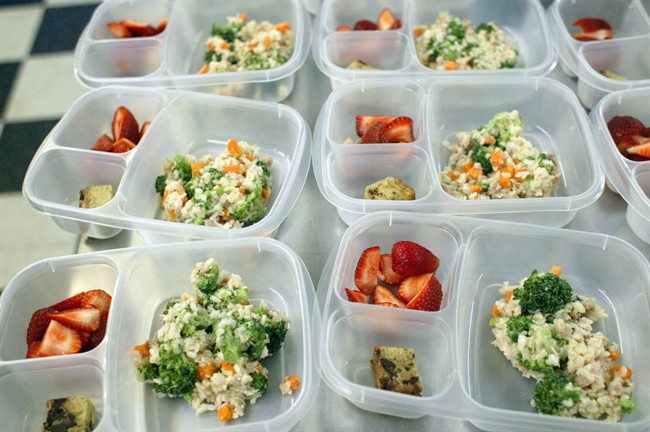Getting the numbers on the scale to tip in your favour isn’t an easy task. Losing weight is a slow and steady process that requires mindful eating, working out and maintaining a balanced lifestyle.

Some people swear off of carbohydrates while others commit to juice fasts and other extreme measures. Global News asked a panel of spokespeople from the Dietitians of Canada to name eight common mistakes people make on their road to weight loss.
READ MORE: 6 misconceptions about nutrition and healthy eating
Here’s what they had to say:
Avoiding bread and other grains like pasta and rice: Carbohydrates are key sources of energy and nutrients, such as fibre and vitamins, especially from whole grains.
“It’s a myth that bread leads to weight gain and that low-carbohydrate diets are a healthy way to lose weight,” Heidi Boyd, a registered dietitian from St. John’s, Nfld., said.
READ MORE: 6 (more) common misconceptions about nutrition
She told Global News that gluten intolerance and adopting a gluten-free diet is a continuing trend. Celiac disease is a food sensitivity triggered by gluten, causing damage to the small intestine while leaving patients with inflammation and abdominal pain among other symptoms. These are the people who have to adhere to strict gluten-free lifestyles.
Research suggests that gluten-free bread and pastas are lower in protein and iron and higher in fat than their traditional counterparts.
READ MORE: Is your gluten intolerance real? Study says gluten sensitivity is fake
“If you aren’t in that group there is no benefit to avoiding grain products,” Boyd said.
Look for “whole grain” in the nutrition label when you’re grocery shopping. And mix up your grains by cooking with bulgur, barley or quinoa, she suggests.
Choosing low fat over full fat fare: “Light” cheese, “fat-free” salad dressing and “low-fat” ice cream are common staples in your fridge and pantry if you’re trying to lose weight. But these versions of your favourite foods may not provide you with the best strategy for dropping a pants size.
READ MORE: Why diet soda may be making you eat more
“I recommend that you enjoy your favourite foods in moderation and eat mindfully, not impulsively,” Andrea Miller, a Whitby-based dietitian, says.
“Substituting a light or low-fat version of your favourite food may leave you less than satisfied and you may end up eating more,” Miller said.
READ MORE: Are low carb diets better than low fat for weight loss?
Some studies have pointed to this habit — reaching for a diet soda had diners eating more calories than their counterparts who had the sweetened drink, for example.
“Also, some low-fat foods may have more sugar and more calories than the higher-fat alternative,” Miller said. Manufacturers need to compensate for a lack of fat after all.
Mindless and distracted eating: Portion control is tough to manage, especially if you’re eating your meals on the go, at your desk at work, or at home in front of the television.
More often than not, people managing diets also have busy schedules — it’s no wonder you end up overeating or eating convenient, but unhealthy fare.
READ MORE: How much sugar should you be eating? How to follow WHO’s guidelines
“Good nutrition is not just about what we eat, but also how and why we eat…distracted eating can lead to overconsumption because we eat more quickly, consume larger portions and may even ignore our fullness cues,” says Brooke Bulloch, a Saskatoon-based dietitian.
Drinking juice daily: If you’re sipping away on juice, you could be having up to six teaspoons of sugar per cup.
You’re better off with eating whole fruit instead of juice — it’s packed with fibre that’ll help to fill you up. Like sugary sweet lattes and energy drinks, fruit juice should be a treat and not a regular staple in your diet, says Lalitha Taylor, an Edmonton-based dietitian.
Swearing off entire food groups: No carbohydrates, no red meat, no dairy — these are big words to live by. The all-or-nothing mindset only sets the stage for failure, according to Andrea D’Ambrosio, a Toronto-based dietitian.
“Have you found yourself saying, ‘No, I can’t even have one bite, I’m on a strict diet’ or on the other end of the spectrum, ‘Well, now that I’ve had a bite, I might as well eat another piece, I blew it,’” she said.
READ MORE: Do fad diets followed by celebrities work?
By thinking in extremes, we create rules that are too difficult to adhere to. She says goals need to be incremental and realistic. That way, your weight loss goals are palatable and you can celebrate the small victories along the way.
Not making time for breakfast: It’s the most important meal of the day because it sets the tone for your metabolism, for your energy levels and fuels your brain and body for the day. Breakfast needs to be quick, easy and healthy if you’re like most people with busy mornings.
READ MORE: Atkins and South Beach – diets garner similar results, Canadian study suggests
The key is to prep the night before, says Janelle Hatch, a Victoria-based dietitian. Put oatmeal in a bowl so that it’s ready for the microwave in the morning. Cut up some fruit and set it aside in the fridge or hard boil eggs so you can grab them and go first thing in the morning.
Relying on powders and pills for nutrition: The weight-loss industry is packed with products that promise they’re your magic solution, Kate Comeau, a registered dietitian out of Halifax, says. Don’t take what labels promise at face value, she warns.
“Be wary of advertising and sales promises. Most people can get all the nutrition they need from food,” she said.
READ MORE: Want to lose weight? U.S. scientists say these diet plans get top marks
Do your homework to make sure you’re covering your bases if you’re not sure you’re getting enough protein, or if you’re eating too many carbs, for example. A consultation with a dietitian may help if you’re confused, she suggests.
Getting stuck in a rut: You’ve figured out what clean eating looks like for you but you’re getting tired of grilled chicken, vegetables and brown rice.
“Including a variety of foods in your diet will not only keep things interesting, it will also help you cover off your nutritional bases,” Casey Berglund, a Calgary-based dietitian, said.
READ MORE: The 41 most nutrient-dense fruits and vegetables
If you’re sick of peanut butter, try almond butter of sunflower seed butter. If you’re tired of rice, swap it out for quinoa, Berglund suggests. Veggies, such as green beans, can be substituted with edamame or snow peas in a recipe, too.
Falling for front-of-package promises: Labels promising that cookies, chips and candies are gluten-free, organic, and low-fat are misleading, Berglund says.
She urges consumers to be savvy and question these claims — these prepackaged goods often have a “health halo” effect.
“Remember your diet should be mostly made up of foods with few ingredients and made at home,” she says.
carmen.chai@globalnews.ca
Follow @Carmen_Chai






Comments